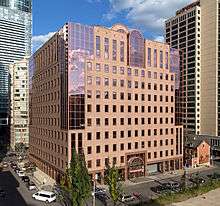Attorney General of Ontario
| Attorney General of Ontario | |
|---|---|
|
Coat of Arms the Government of Ontario | |
| Executive Council of Ontario | |
| Style | The Honorable |
| Term length | Four years, two term limit |
| Inaugural holder |
William Henry Draper 1841 |
| Website | Office of the Attorney General |

The Attorney General of Ontario, the chief legal adviser to the Her Majesty the Queen in Right of Ontario, is a senior member of the Executive Council of Ontario (or cabinet) and governs the Ministry of the Attorney General of Ontario - the department responsible for the oversight of the justice system within the province. The Attorney General is an elected Member of Provincial Parliament who is appointed on the Constitutional Advice of the Premier of Ontario and appointed by the Lieutenant-Governor of Ontario. The Ministry's goal is to provide a fair and accessible justice system which reflects the needs of the diverse communities it serves across government and the province. The Ministry represents the largest justice system in Canada and one of the largest in North America. It strives to manage the justice system in an equitable, affordable and accessible way throughout the province.
The Ministry delivers and administers a wide range of justice services including:
- administering approximately 115 statutes;
- conducting criminal proceedings throughout Ontario;
- providing legal advice to, and conducting litigation on behalf of, all government ministries and many agencies, boards and tribunals;
- providing advice on, and drafting, all legislation and regulations; and
- coordinating and administering court services throughout Ontario.
The Ontario Crown Attorney's Office, the Office of the Public Guardian and Trustee, the Children's Lawyer (formerly called the Official Guardian), and the Special Investigations Unit (SIU) all fall within MAG's responsibilities. The Ministry also funds Legal Aid Ontario which is administered by an independent Board.
As of June 13, 2016, the Attorney General of Ontario is the Honourable Yasir Naqvi.
Attorneys General have the authority to represent the provincial government in court personally, but this task is almost always delegated to crown attorneys, or to Crown Counsel in civil cases. Ian Scott, who was a prominent courtroom lawyer prior to entering politics, chose to plead the crown's case in court for several cases related to constitutional law.
Most holders of the office were practicing lawyers or have legal training. Marion Boyd is the only AG who was not a lawyer.
List of Attorneys-General of Upper Canada
- John White (Frontenac County) 1791–1800
- Robert Isaac Dey Gray 1800–1801
- Thomas Scott 1801–1806
- William Firth 1807–1812
- G. D'Arcy Boulton 1814–1818
- Sir John Robinson, 1st Baronet, of Toronto 1818–1829; acting AG 1812–1814
- Henry John Boulton 1829–1832
- Robert Sympson Jameson 1833–1837 - last British appointed AG
- Christopher Alexander Hagerman 1837–1840 - first Canadian born AG of Upper Canada
- William Henry Draper 1840–1841 - last AG of Upper Canada
List of Attorneys-General of the Province of Canada (Canada West)
In 1841 the AG replaced the role of AG of Upper Canada:
- William Henry Draper 1841–1843
- Robert Baldwin 1843–1848
- William Buell Richards 1848–1854
- John A. Macdonald 1854–1862, 1864–1867
- John Sandfield Macdonald 1862–1864
After 1867, the Attorney General was split into a federal and provincial counterparts:
- Attorney General of Ontario
- Attorney General of Quebec (renamed as Ministry of Justice in 1965)
- Attorney General of Canada
List of Attorneys-General of Ontario
- John Sandfield MacDonald*, coalition, 1867–1871
- Adam Crooks, Liberal, 1871–1872
- Oliver Mowat*, Liberal, 1872–1896
- Arthur S. Hardy*, Liberal, 1896–1899
- John Morison Gibson, Liberal, 1899–1904
- Francis Robert Latchford, Liberal, 1904–1905
- James Whitney*, Conservative, 1905
- James Joseph Foy, Conservative, 1905–1914
- Isaac Benson Lucas, Conservative, 1914–1919
- William Raney, United Farmers, 1919–1923
- William Folger Nickle, Conservative, 1923–1926
- William Herbert Price, Conservative, 1926–1934
- Arthur Roebuck, Liberal, 1934–1937
- Gordon Conant**, Liberal, 1937–1943
- Eric Cross, Liberal, 1943
- Leslie Blackwell, Progressive Conservative, 1943–1949
- Dana Porter, Progressive Conservative, 1949–1955
- Kelso Roberts, Progressive Conservative, 1955–1962
- Fred Cass, Progressive Conservative, 1962–1964
- Arthur Wishart, Progressive Conservative, 1964–1971
- Allan Lawrence, Progressive Conservative, 1971–1972
- Dalton Bales, Progressive Conservative, 1972–1974
- Robert Stanley Welch, Progressive Conservative, 1974–1975
- John Clement, Progressive Conservative, 1975
- Roy McMurtry, Progressive Conservative, 1975–1985
- Robert Stanley Welch, Progressive Conservative, 1985
- Alan Pope, Progressive Conservative, 1985
- Ian Scott, Liberal, 1985–1990
- Howard Hampton, New Democratic Party, 1990–1993
- Marion Boyd, New Democratic Party, 1993–1995
- Charles Harnick, Progressive Conservative, 1995–1999
- Jim Flaherty, Progressive Conservative, 1999–2001
- David Young, Progressive Conservative, 2001–2003
- Michael J. Bryant, Liberal, 2003–2007
- Christopher Bentley, Liberal, 2007–2011
- John Gerretsen, Liberal, 2011–2014
- Madeleine Meilleur, Liberal, 2014–2016
- Yasir Naqvi, Liberal, 2016–Present
*As Premier
** Conant remained Attorney-General when he served as Premier of Ontario from October 21, 1942 until May 18, 1943, when he resigned from both positions.
.svg.png)